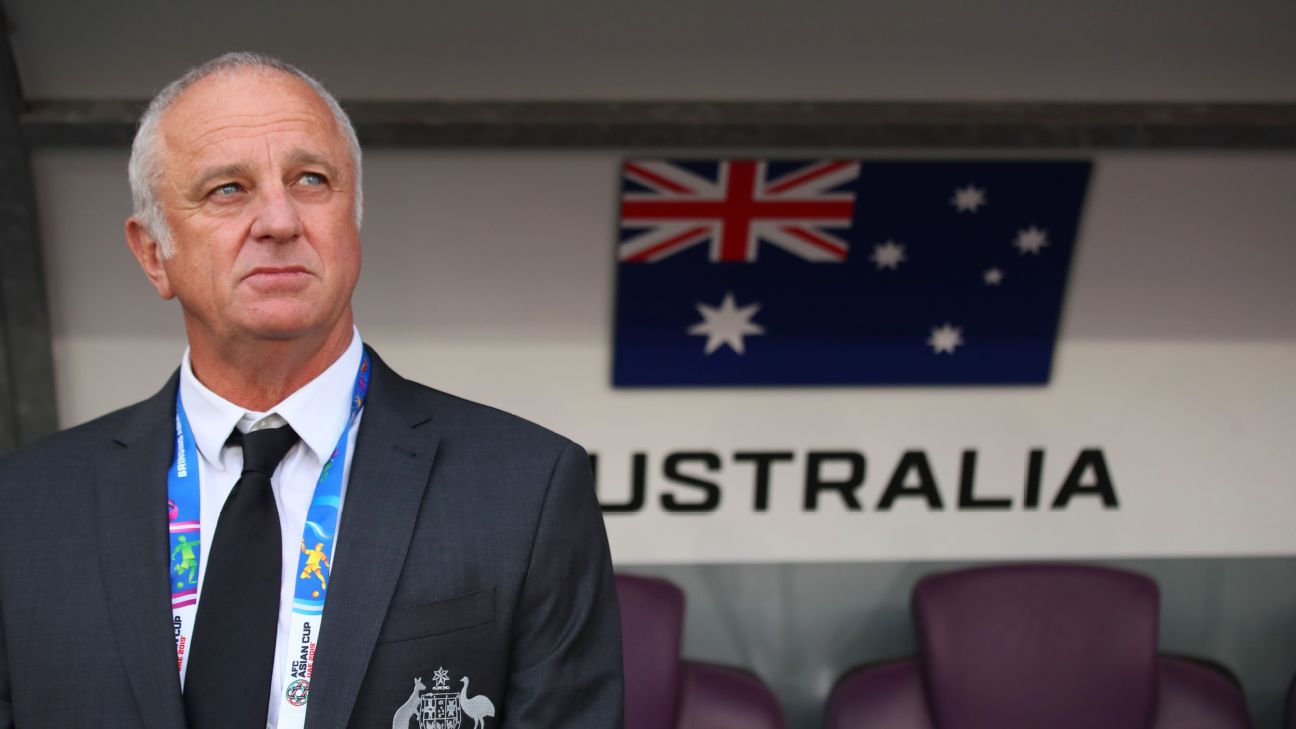



“When I watched the Socceroos in Russia, we were thin on depth,” Graham Arnold said on Thursday. “The only place the depth can come from is underneath.”
It was only minutes into the Socceroos and Olyroos coach’s scheduled teleconference with media, following the latter’s qualification for next year’s AFC Under-23 Championship, but this answer was almost the perfect cue for Luciano Michelini’s Frolic — otherwise known as the theme to Curb Your Enthusiasm.
There was little to contest in terms of logic on the surface, but considering who provided the answer, the irony in it was pretty, pretty, pretty … pretty deep. But Arnold went on.
“I took this job on to try and help the kids with their careers and help them become Socceroos,” he added.
“One thing that I’m adamant about, it can’t be that they turn up next January, don’t play a game together, don’t have any training camps or preparation.
“We’ll have two very tough teams in our group, no matter which way [the draw] goes.”
Again, reasonable logic and aims at face value. The Expectant One is correct in one sense. In any craft or professional environment, individuals need to invest time and effort in order to improve. That is not exclusive to football, or sport even.
– Olyroos bullish about Japan 2020 qualification
– Jukic: Will Australia’s national technical director please stand up?
In footballing terms, though, there is something deeply wrong about someone who once quipped they didn’t know the A-League was a development league, now bemoaning a shallow talent pool at international level for Australia — let alone championing themselves as an advocate for younger footballers.
Funnily, the 2018 AFC Under-23 Championship was the topic of discussion when the then-Sydney FC coach controversially remarked on denying that precious time.
“I was maybe the only coach who looked at the international programme before the season started,” he almost triumphantly said back in January last year.
The 55-year-old’s tenure with Sydney FC is important, contextually.
After all, the international calendar was one of the very reasons Arnold’s squad composition with Sydney was increasingly weighted towards older players, because he had the financial means to do so — unlike his successful tenure with the Central Coast Mariners.
Meanwhile, the numbers paint a stark picture. In Arnold’s first term upon returning from Japan, players aged 20 or under saw 12.08 percent of Sydney’s total minutes in the 2014-15 home and away season. Players aged 30 or over saw 36.95 percent.
Also notable in the second half of that season was Arnold’s plea for then-Olyroos coach Aurelio Vidmar to not call up one of those players in the former category, Terry Antonis, as qualification for the Rio Olympics beckoned.
Below the surface of Sydney’s domestic dominance, the distance between Antonis and the Sky Blues boss became interplanetary by the end of Arnold’s time there.
In the 2017-18 regular season, Sydney held the A-League’s highest percentage in minutes allocation for players aged 30 and over at 53.74 percent, a score higher than the Brisbane Roar squad — 51.33 percent — that was begrudgingly known as “Dad’s Army.”
At the same time, Sydney also held the lowest percentage in the A-League for players aged 20 or under at 1.56 percent.
It’s strangely fitting that one of those players in the 20-or-under category last season, who was not in one of Sydney’s domestic matchday squads from December onwards, has gone on to have a breakout in Europe with the benefit of regular first-team minutes.
After a loan spell which saw a total of four minutes before his 21st birthday in November, Anthony Kalik has been one of the Croatian first division’s surprise stories this term — standing out in another loan spell with bottom side Rudes, before a call back to his parent club of Hajduk Split in the winter break.
Playing in a range of midfield positions, Kalik was immediately prominent in victories over Hajduk’s closest rivals for European spots, Lokomotiva Zagreb and Osijek.
Despite the risk playing younger footballers entails, they can only improve with playing time at a senior level, developing clarity and experience through the trust placed in them.
This is particularly relevant in Australian football, a country lacking in match-deciding individuals and clubs that must look to the development of talent to create avenues for financial self-sustainability.
While the rest of the A-League has been traditionally negligent in providing scope to younger footballers, Arnold went further and actively opposed it over the previous five years.
With this all in mind, Arnold’s comments about the lack of depth in Australian football and the need to make the most of every international window are rendered hypocritical, and this is separate from discussion on the viability and worth of under-23 football in a developmental sense.
Regular international camps can help build synergy and cohesion between players but, in terms of depth and individual talent to create tactical optionality, time at club level is most important.
Although the decisions and comments a coach make are inextricably linked to their all-important authority, there has nevertheless been a disturbing track record in changing narratives — or at least attempts to change them — from the Socceroos coach on a range of topics.
This latest attempt raises the question: Is Arnold’s dual role as both the Socceroos and Olyroos coach all about — as he put it — helping the kids? Or is it about self-preservation?
